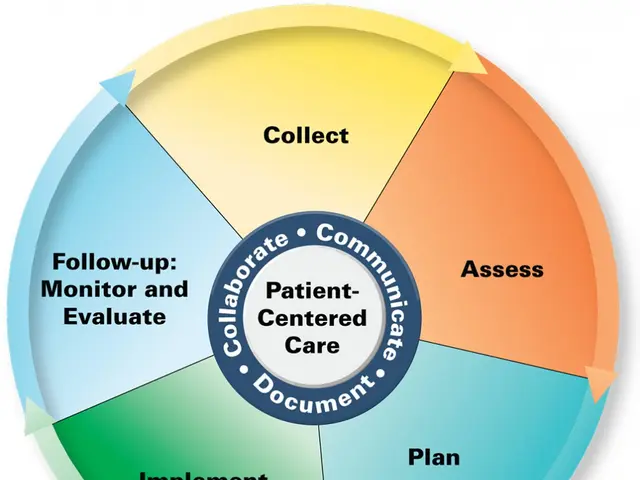Fresenius Navigates Trump Tariffs: A CEO's Battle Cry
- *
Fresenius strengthens its position, aiming to thwart Trump's tariff implementation - Fresenius to Expand and Evade Trump's Import Duties
In the face of potential pharmaceutical tariffs under President Trump, healthcare juggernaut Fresenius is steering through choppy waters with steady revenue and negotiations with U.S. officials. A robust performance from subsidiaries Helios and Kabi in the opening quarter of 2021 has CEO Michael Sen plotting a course for achieving annual targets, even with the specter of tariffs looming.
The U.S. government has so far excluded pharmaceutical imports from tariff sanctions, but a review is afoot. "We're in cahoots with the local brass," Sen divulges. Fresenius can make a persuasive case for its role in supplying the Yank healthcare system with affordable generic meds, which it churns out predominantly stateside, while there occasionally are drug shortages Stateside.
America remains a key market for Fresenius, with the company sinking a significant ten percent of its income there via its generic offshoot Kabi. The lion's share of the drugs peddled in the USA - a whopping 70 percent - are homegrown, making Fresenius relatively shielded from import tariffs compared to foreign competitors like India and China in the generic arena.
Strong First Quarter
Q1 was a stunning success for Fresenius, with growth numbers that made heads turn. Revenue, clearing of special items, climbed a zippy seven percent year-on-year to a hefty 5.63 billion euros. The adjusted earnings before interest and taxes (EBIT) swelled a hearty four percent to 654 million euros. A cost-cutting program and core business at Kabi, revolving around drugs, clinical nutrition, and medical tech, provided the wind beneath its wings.
Consolidated net income surged a robust 12 percent to 416 million euros, excluding its stake in dialysis specialist Fresenius Medical Care.
Fresenius sets its sights on increasing revenue, excluding special and currency impacts, by a robust four to six percent by 2025. Known hazards like unfavorable tariffs are factored into plans, but only to the extent their future effects can currently be gauged.
- Fresenius SE
- Pharma
- Donald Trump
- USA
- Michael Sen
- Bad Homburg
- U.S. President
Enrichment Data:
A Closer Look
Fresenius SE & Co. KGaA is a colossal healthcare company, bulking up medical drugs, gear, and devices for both in-patient and outpatient use. A good chunk of its business is under the care of Fresenius Kabi, which concentrates on generic injectables, nutritional supplies, and medical tech[4]. Fresenius commands a notable presence in the U.S. generic market, with a whopping 70 percent of its U.S. output manufactured locally[3].
The Impact of Tariffs
The U.S. pharmaceutical sector has juggled the prospect of tariffs under Trump's watch, although pharmaceutical imports initially escaped comprehensive tariff hikes. Currently, a review of these exemptions is happening[3]. Leveraging its homegrown manufacturing capabilities, Fresenius may shrug off tariffs to a greater extent than competitors hailing from distant lands like India and China[3].
A Strategic Shift
Fresenius's domestic manufacturing aligns with Trump's emphasis on domestic production. By prioritizing the supply of essential and affordable generic drugs to the U.S. healthcare system, Fresenius seeks to capitalize on this edge in lobbying with U.S. powers who shape trade policy[3]. This strategic positioning could help deflect any ill effects from tariffs and secure a foothold in the market.
Recent Developments
In recent goings-on, Fresenius has been gearing up its biosimilar portfolio, complete with FDA approval of its denosumab biosimilars. This evidence of its commitment to biopharmaceutical innovation demonstrates the company's adaptability to the rapidly changing regulatory milieu[1]. Moreover, Fresenius is streamlining its manufacturing network, which could solidify its operational efficiency and competitiveness on a global scale[2]. These actions hint that Fresenius is prepared to weather the storm, balancing any risk factors induced by tariffs.
- Despite the ongoing tariff review by the U.S. government, Fresenius, the German healthcare company, is advocating for its significant role in providing affordable generic medications to the U.S. healthcare system.
- A large portion of Fresenius's drugs sold in America are manufactured domestically, making it relatively shielded from import tariffs, as compared to competitors like India and China in the generic market.
- Fresenius aims to increase revenue by 4 to 6 percent by 2025, while accounting for known risks like unfavorable tariffs, to the extent their future effects can be estimated.
- In the first quarter of 2021, Fresenius reported impressive growth, with revenue of 5.63 billion euros and adjusted earnings before interest and taxes (EBIT) of 654 million euros, fueled by its cost-cutting program and core businesses in drugs, clinical nutrition, and medical technology.




